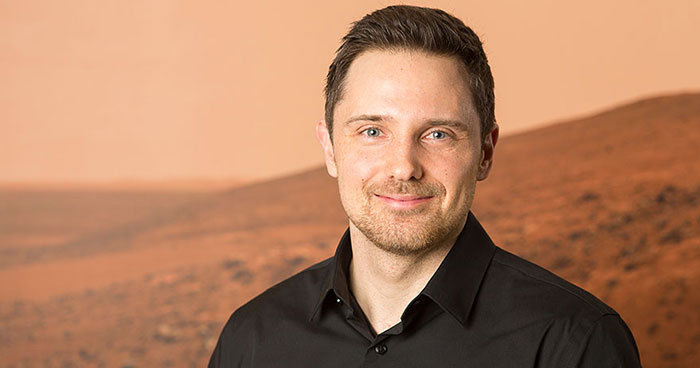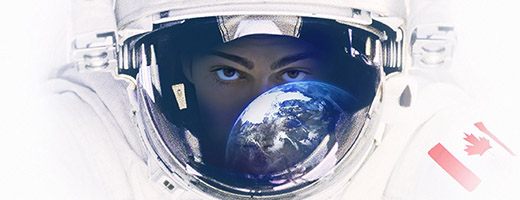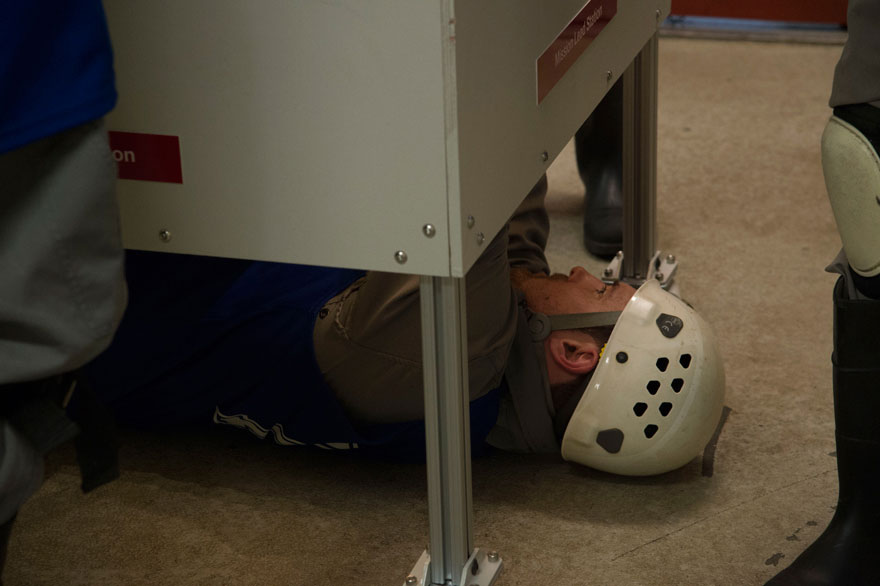Astronaut candidate's profile
The candidates participating in the astronaut selection process all have unique journeys and outstanding qualities and skills. You can read their remarkable profiles here.
Bamsey, Matthew

Where were you born?
Burlington, Ontario, Canada
Where do you currently live?
Bremen, Germany
Education
- Bachelor's, aerospace engineering – Carleton University
- Master's, bioastronautics – University of Colorado
- Ph.D., environmental biology – University of Guelph
What is your current job?
Chief systems engineer, EDEN ISS Project, German Aerospace Center - The EDEN ISS project is developing a greenhouse that will be sent to the German Antarctic station, Neumayer III. It will provide the station's 9-10 overwinterers with fresh food throughout the year while testing various technologies that will keep astronauts alive on long-duration space missions. I am responsible for helping engineers and scientists from our 14 worldwide partners design and manufacture their hardware, to build and test the facility here in Germany and later, to deploy the facility to Antarctica.
Why do you want to become an astronaut?
The simple answer: exploration. Humans need to explore. We need to be doing something outside of our "day to day" to push boundaries, to come up with new ideas, to understand what is possible. Exploration is not just going to a new place, but it is also investigating new areas of research, advancing relations between people and, on a personal level, trying new things (subjects in school, hobbies, etc.). This is the only way to gain new perspective and understanding and to find out what may be even more important to humankind in the future.
If you could pick one place to explore in our solar system where would you go?
What motivated you to study in your field?
I selected to study aerospace engineering because I desired to build hardware that would fly, in particular associated with human space flight. I studied environmental biology because for long-duration space flight, closing up the water, air and food loops will be crucial, and plants can do all three. This integration of technology and biology (plants and humans) means research in this field is always interesting. The pull of space technology required for space greenhouses can also provide considerable benefit here terrestrially.
Think back to a teacher who had a positive impact on your life. What did she/he do to influence you?
Although I have had many teachers who had an important impact on my life, my high school chemistry teacher, Mr. Bruce, was the one who influenced me most. In addition to being an amazing teacher (and just a genuinely great person), it was his passion that was unmatched. Seeing someone who is so passionate about what they are doing taught me a tremendous amount about the importance of following your interests to find a career you love. Finding your passion is one of the most important things someone can get out of school. Thanks, Mr. Bruce!
What do you like best about your job?
I have been fortunate to be able to forge a project from idea to deployment. There is something special about working on a small team with an idea (an Antarctic greenhouse to test technologies for space!), having that idea come to fruition with a proposal, and now helping lead a large international team to actually implement such an exciting project. I love my job because of the great mix of analysis and actual hands-on work, the international flavour and the fact that the project is an excellent space outreach tool. Another bonus is that the project involves travel to Antarctica!
Which living person do you most admire? OR Who are your heroes in real life?
There have been so many great explorers I admire, but my real heroes are my parents. They gave me the complete flexibility to follow my dreams and pursue whatever was of most interest to me, and they continue to be supportive today. They also taught me a great deal about the importance of always treating others with respect, including those people you do not know, putting extra energy and time to invest in such things. This side of human spirit is what makes me admire them and gives me so much confidence in the goodness of people in general.
What is your favourite sci-fi movie?
Both classics, but possibly Silent Running and Invasion of the Body Snatchers. Silent Running has obvious ties to space-based plant production/greenhouses, and I love Invasion of the Body Snatchers just because of how it ends. Crazy! For non-sci-fi movies, I would have to go with Bon Cop, Bad Cop.
What is your motto?
Life is good. And it is!
If you get chosen to be the next Canadian astronaut what will be the first thing you do?
What is the best career advice you've ever received?
I have had some truly phenomenal bosses and mentors in my career, and I have learned something different from all of them, but one very important theme has been to lead by doing and thus even as a leader be ready to do the boring or unrewarding tasks. One other source of advice I look back to often is a book that my mom gave me when I left home for university for the first time. The book is filled with good advice "just in case I may have missed an item or two at home," she said with a smile.
What is your most treasured possession?
When my dad retired, one of his first projects was to build my brother and me a canoe each. The cedar strip canoe that he built from scratch is my most treasured possession, as he put a tremendous amount of effort into making it. Also, I am presently living outside Canada, and it represents an important part of home. Each time I think about it, I remember previous adventures out in the wilderness and at the family's cottage. A canoe has always been an important tool for exploration and adventure in Canada.
What is your favourite place on Earth?
I feel very fortunate that my wife and I have had the chance to live and work in a number of different places in Canada and worldwide. Each experience brings something different, and that is what makes travelling to different places so rewarding. If I were forced to pick one place, though, it would be the Canadian Arctic. If only all Canadians could have the opportunity to see this majestic place! A close second would be a space museum.
What do you consider your greatest achievement?
I consider my greatest achievement to be that I have been able to become a "participatory researcher" in that I have had the opportunity to directly participate in employing experiments or hardware that I have developed into various extreme environments. This has included conducting work over ten summers in the Arctic (Arthur Clarke Mars Greenhouse), participating in a four-month Moon–Mars simulation, participating in several parabolic flight campaigns during postdoctoral work in Florida, and now working on an Antarctic project. I have been fortunate to have been able to share these experiences via presentations with students of various ages.
What is your favourite book?
As a space history book collector, it is tough to pick just one. Unfortunately, all of our books from our home library (I miss that room!) are currently sitting in a storage locker in St-Bruno-de-Montarville waiting for our return to North America. If I had to make a choice, it would probably be either Deke! by Deke Slayton or Apollo: An Eyewitness Account by Astronaut/Explorer Artist/Moonwalker Alan Bean (amazing artwork – definitely a good one to be left out on the coffee table).









